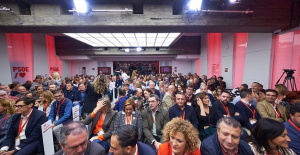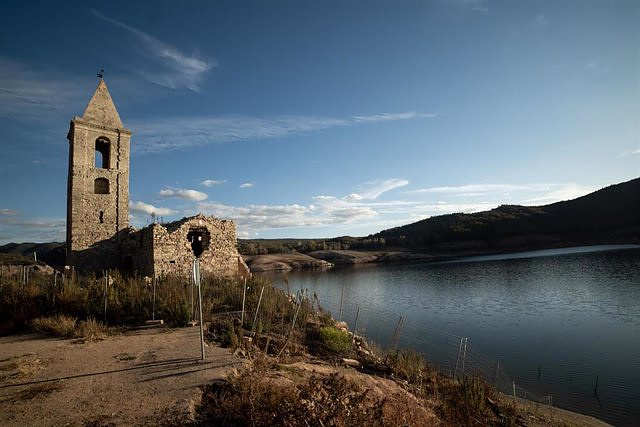The judge maintains that the energy company "put all the hydroelectric energy it had on the market"
The National Court has acquitted Iberdrola Generación España and four of its directors of the crime related to the market and consumers of which the Prosecutor's Office accused them for the increase in the price of energy at the end of 2013.
In the ruling, reported by Europa Press, the judge of the Central Criminal Court, José Manuel Fernández Prieto, recalls that the Public Ministry maintained that those managers related to energy management had participated in devising a system that altered that price that consumers paid. For their part, the defendants' defenses always maintained that this alteration was produced by the energy supply system itself and that they did not devise such a plan.
Now, the judge explains that this Energy Management department "enjoyed autonomy in making decisions that affected its competence", that it was "known and consented to by the company" and that "it was not subject to control." of the CEO, of the head of the Liberalized Business Department on which he organically depended, or of the Board of Directors, to whom he did not account for his actions.
He adds that this department approved the studies and proposals of the different 'traders' - technicians who set the offers that Iberdrola put on the market - that were made with the hydroelectric plants of the Duero, Sil and Tajo rivers. And it points out that, as witnesses have corroborated in the plenary session, Iberdrola Generación between November 30 and December 23, 2013 "put on the market (...) all the hydroelectric energy it had available" so it did not deduct from the market that source of energy.
The judge recalls that "the accusations themselves in their written conclusions do not deny this point" and base the commission of the crime "exclusively on the price at which this company offered the hydraulic energy it produced on the market, which they understand was excessive and unjustified, which motivated it not to "marry" - not to enter - into the market and gave rise to an increase in the prices of electrical energy by putting the combined cycles into operation.
For the judge, this is an "extensive interpretation of the type - of the crime - that is not consistent with the principles of minimal intervention and legality that regulate criminal law." And he remembers that "hydroelectric energy is and was at the time of the facts prosecuted as a free market."
The ruling adds that given that the ceiling at which energy could be offered at that time was set at 180 euros per megawatt/hour and given that in the temporary period between November 30 and December 23, 2013, was that price reached at no time, "it is frankly very complicated to appreciate the existence of a crime for the performance of something that was not prohibited and therefore was legally permitted."
On the other hand, the judge severely criticizes the experts of the National Market and Competition Commission (CNMC) - "on which the claims for conviction are based almost exclusively" - whom he accuses of having carried out their value judgment "based on an unclear procedure, which they expressly state was not used before these events, nor after them."
He adds in this regard that the CNMC's analysis of the price increase on those dates is only "a futuristic probability study" where "the criteria of reasonableness they allege are never explained by the experts, nor why certain periods are taken into consideration." comparison periods and not others".
And he compares the study of these experts with those who presented the defenses to summarize that basically the CNMC gives priority in its analysis to the volume of water reserves accumulated in the Iberdrola Generación swamps, which they understand was equal to or greater than that of the two previous years, while defense experts place greater emphasis on the producible - the amount of rainwater - and the weather forecast.
The magistrate reminds the thread that where there is no contradiction is that at that time "there was a long-lasting drought, lasting more than 40 days, which was put to an end by an explosive cyclogenesis that took place on December 23, 2013." .
"For a layman it is clear that none of these parameters can be downplayed, since according to the rules of logic the volume of impounded water would a priori be a relevant data in its use to generate hydraulic energy, but this cannot simply dismiss the importance of the producible," he explains.
And he adds to this that "it is mere common sense that, no matter how much water is impounded, if it does not rain and it is not expected to rain, the reserves will be exhausted quickly, and if all of it is used in a month it will not be have in the following ones, until the rainfall returns to supply water to the reservoirs.
THE ALLEGED RETALIALS TO THE GOVERNMENT
Regarding the thesis that Iberdrola acted with the intention of de-supplying a sector of the market, of forcing a change in prices, or of seriously harming consumers as a form of "retaliation" against the Government of Mariano Rajoy for withdrawing from the Budgets of the State in 2014, an item of 3.6 billion euros that was intended to alleviate the electricity deficit of the electricity companies in 2013", the magistrate recalls that there is no evidence to prove it.
"On the contrary, the statements made in the plenary session by the then Minister of Industry --José Manuel Soria-- and the Secretary of State of the same Ministry --Alberto Nadal, make it clear that there were tensions due to said event but that they were not greater. than others who usually maintained with the energy companies," he indicates.
And remember that both pointed out that although the Treasury did not accept the commitment of the 3,600 million, "the deficit was transferred to a securitization fund, the FADE, so that, charged to the entire electrical system, the monthly receipts would finance the costs derived from the amortization of capital and interest".
He then recalls the testimony of two of the company's traders in the plenary session to point out that the thesis that they falsified their analyzes "on orders from their superiors is a matter lacking proof and is denied" by themselves. "They are conclusive in stating that they were in charge of making the weekly production forecasts and the sales offers to the daily market, denying that they received interference or recommendations from their company superiors in carrying out their analyzes and proposals for the offers." , Explain.

 Exploring Cardano: Inner Workings and Advantages of this Cryptocurrency
Exploring Cardano: Inner Workings and Advantages of this Cryptocurrency Seville.- Economy.- Innova.- STSA inaugurates its new painting and sealing hangar in San Pablo, for 18 million
Seville.- Economy.- Innova.- STSA inaugurates its new painting and sealing hangar in San Pablo, for 18 million Innova.- More than 300 volunteers join the Andalucía Compromiso Digital network in one month to facilitate access to ICT
Innova.- More than 300 volunteers join the Andalucía Compromiso Digital network in one month to facilitate access to ICT Innova.-AMP.- Ayesa acquires 51% of Sadiel, which will create new technological engineering products and expand markets
Innova.-AMP.- Ayesa acquires 51% of Sadiel, which will create new technological engineering products and expand markets STATEMENT: ELFBAR and LOST MARY reveal progress in the fight against illicit vapers (1)
STATEMENT: ELFBAR and LOST MARY reveal progress in the fight against illicit vapers (1) STATEMENT: ELFBAR and LOST MARY reveal progress in the fight against illicit vapers (2)
STATEMENT: ELFBAR and LOST MARY reveal progress in the fight against illicit vapers (2) The PSOE is holding a Federal Committee this Saturday that will serve to close ranks with Sánchez so that he does not resign
The PSOE is holding a Federal Committee this Saturday that will serve to close ranks with Sánchez so that he does not resign The Ibex 35 closes the week at its highest since 2015 and is already looking at 11,200
The Ibex 35 closes the week at its highest since 2015 and is already looking at 11,200 How Blockchain in being used to shape the future
How Blockchain in being used to shape the future Not just BTC and ETH: Here Are Some More Interesting Coins Worth Focusing on
Not just BTC and ETH: Here Are Some More Interesting Coins Worth Focusing on UPV students build a prototype of a wooden house to move to Equatorial Guinea
UPV students build a prototype of a wooden house to move to Equatorial Guinea The UA opens the call for the Impulso 2024 Awards for the best innovative business initiatives
The UA opens the call for the Impulso 2024 Awards for the best innovative business initiatives ALI, virtual assistant from Alicante, internationally recognized by the OECD
ALI, virtual assistant from Alicante, internationally recognized by the OECD Retrópolis brings the golden age of video games and computing to the UPV
Retrópolis brings the golden age of video games and computing to the UPV A million people demonstrate in France against Macron's pension reform
A million people demonstrate in France against Macron's pension reform Russia launches several missiles against "critical infrastructure" in the city of Zaporizhia
Russia launches several missiles against "critical infrastructure" in the city of Zaporizhia A "procession" remembers the dead of the Calabria shipwreck as bodies continue to wash up on the shore
A "procession" remembers the dead of the Calabria shipwreck as bodies continue to wash up on the shore Prison sentences handed down for three prominent Hong Kong pro-democracy activists
Prison sentences handed down for three prominent Hong Kong pro-democracy activists ETH continues to leave trading platforms, Ethereum balance on exchanges lowest in 3 years
ETH continues to leave trading platforms, Ethereum balance on exchanges lowest in 3 years Investors invest $450 million in Consensys, Ethereum incubator now valued at $7 billion
Investors invest $450 million in Consensys, Ethereum incubator now valued at $7 billion Alchemy Integrates Ethereum L2 Product Starknet to Enhance Web3 Scalability at a Price 100x Lower Than L1 Fees
Alchemy Integrates Ethereum L2 Product Starknet to Enhance Web3 Scalability at a Price 100x Lower Than L1 Fees Mining Report: Bitcoin's Electricity Consumption Declines by 25% in Q1 2022
Mining Report: Bitcoin's Electricity Consumption Declines by 25% in Q1 2022 Oil-to-Bitcoin Mining Firm Crusoe Energy Systems Raised $505 Million
Oil-to-Bitcoin Mining Firm Crusoe Energy Systems Raised $505 Million Microbt reveals the latest Bitcoin mining rigs -- Machines produce up to 126 TH/s with custom 5nm chip design
Microbt reveals the latest Bitcoin mining rigs -- Machines produce up to 126 TH/s with custom 5nm chip design Bitcoin's Mining Difficulty Hits a Lifetime High, With More Than 90% of BTC Supply Issued
Bitcoin's Mining Difficulty Hits a Lifetime High, With More Than 90% of BTC Supply Issued The Biggest Movers are Near, EOS, and RUNE during Friday's Selloff
The Biggest Movers are Near, EOS, and RUNE during Friday's Selloff Global Markets Spooked by a Hawkish Fed and Covid, Stocks and Crypto Gain After Musk Buys Twitter
Global Markets Spooked by a Hawkish Fed and Covid, Stocks and Crypto Gain After Musk Buys Twitter Bitso to offset carbon emissions from the Trading Platform's ERC20, ETH, and BTC Transactions
Bitso to offset carbon emissions from the Trading Platform's ERC20, ETH, and BTC Transactions Draftkings Announces 2022 College Hoops NFT Selection for March Madness
Draftkings Announces 2022 College Hoops NFT Selection for March Madness























